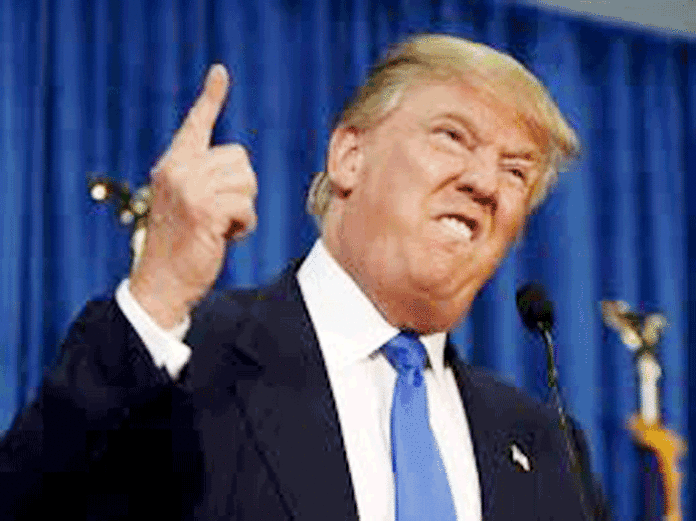By Jeph Ajobaju, Chief Copy Editor
United States Supreme Court ruling against Donald Trump on July 9 over his attempt to conceal tax returns and personal financial records may eventually land him in jail if the grand jury inquiry finds him guilty of financial and bank fraud.
A federal judge has ordered a hearing for July 16 on whether the U.S. president has additional arguments against subpoena of his taxes and other financial records by Manhattan District Attorney, Cyrus Vance.
If convicted on the crimes he allegedly committed before running for the Oval Office, Trump would be the first person to be sent to jail before or after serving as U.S. president.
The Supreme Court delivered a 7-2 decision on subpoenas for the tax returns and personal financial records, unanimously rejecting his broadest claims of “absolute” immunity in a New York state criminal investigation,
But the Supreme Court ruled that lower courts did not do enough to scrutinise congressional subpoenas for similar records.
Politico reports that the pair of highly anticipated decisions likely mean more delays and court proceedings on both subpoenas, increasing the odds that Trump makes it to the November 3 election without releasing his tax and financial details to the prosecutors and congressional committees demanding them.
However, even as the high court turned down Trump’s arguments, the justices seemed to ensure weeks or months of ongoing litigation, because he will now be able to make other legal arguments that the records are legally privileged.
If lower courts deliver any adverse rulings between now and November, Trump’s lawyers could make another bid to have the Supreme Court freeze the process, effectively postponing action until after the election, according to Politico.
However, CNN adds, what the Supreme Court did is make it very likely that a grand jury may, at some point, see Trump’s tax history. And that Congress won’t – at least no time soon.
Add it all up then and that’s a very good thing for Trump, who has fought tooth-and-nail for years not to let the public see any details of his past financial life.
It, of course, wasn’t always this way.
“We’re working on that now,” Trump said in late January 2016 of the release of his past taxes. “I have big returns, as you know, and I have everything all approved and very beautiful and we’ll be working that over in the next period of time.”
But sometime between late January and mid-February 2016 – the space of just a few weeks – Trump had begun to change course, according to CNN.
“You don’t learn anything from a tax return,” he said at a GOP debate in February 2016. “I will say this. Mitt Romney looked like a fool when he delayed and delayed and delayed and Harry Reid baited him and Mitt Romney didn’t file until a month and a half before the election and it cost him bigly ….
“As far as my return, I want to file it except for many years, I’ve been audited every year. Twelve years or something like that. Every year they audit me, audit me, audit me. … I will absolutely give my return but I’m being audited now for two or three [years’ worth] now so I can’t.”
And that was it. Trump has spent the last several years insisting that he can’t release his taxes because he is under audit by the IRS (Inland Revenue Service). (Call the Guinness Book of World Records because this has to be the longest audit on record!).
Exploiting loopholes in the tax code
Of course, there is no law that bars Trump from releasing his returns. In fact, there is precedent for a president – say that 10 times fast! – to do so.
Seeking to knock down the idea that he was a crook, Richard Nixon released his tax returns, while in office, in 1973. So it’s not that Trump can’t release his returns under audit. It’s that he doesn’t want to.
The other main reason offered by Trump’s allies for his refusal to turn over his returns is that no one cares to see them.
The most outspoken advocate of this position is White House counselor Kellyanne Conway. “We litigated this all through the election. People didn’t care,” she said way back in early 2017.
“They voted for him, and let me make this very clear: Most Americans are very focused on what their tax returns will look like while President Trump is in office, not what his look like,” she argued.
The reality is that, at some point in early 2016 as it became clear to Trump and his cohort that he might actually be the Republican nominee, a decision was made that whatever was in the returns was more damaging than the negative press he would take for not releasing any documentation of his financial background.
What could that be? While some speculate that his returns would show debt to foreign banks, the more likely explanation is that tax returns would reveal that he paid zero (or close to it) in taxes for years – thanks to loopholes in the tax code.
CNN said it is also possible that the returns would be embarrassing for Trump, showing that he is less wealthy than he has boasted to be and that his business empire is a bit of smoke and mirrors.
Regardless of the reasons, Trump badly wants to keep them from the public – ideally forever, but practically speaking, until after the election.
And the Supreme Court on Thursday virtually ensured that Trump gets that wish. Which, in his book, is a win.











